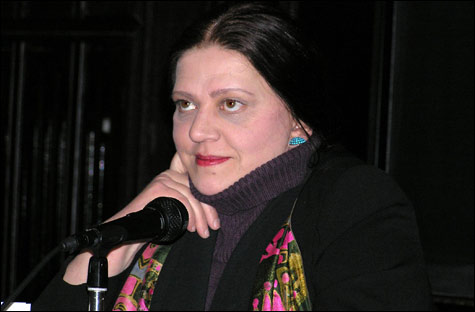
FOLK FORMS: Tolstaya’s stories of childhood come with the full knowledge of the horrors that obsess and fascinate children. |
Reviews of Tatyana Tolstaya (great-grandniece of Leo Tolstoy) are stuffed with adjectives that strain to capture the vigorous joy of her prose or the terrible engine of her imagery. Assembling all her stories in one volume might actually be dangerous. White Walls should probably be accompanied by a dosage warning: “Take Only Once a Day. Do Not Read Before Bedtime.” It includes works from On the Golden Porch (1990) and Sleepwalkers in the Fog (1992) as well as more recent stories from the New Yorker. Her post-apocalyptic fantasy novel The Slynx (2003) has also just been reprinted by New York Review Books, and she comes to the Harvard Book Store to talk about her work next Friday.
Tolstaya writes often of childhood, but with the full knowledge of the horrors that obsess and fascinate children: the death of animals, what lurks under the bed and behind the curtains, what is old, what is forbidden. In “On the Golden Porch” the Edenic garden of childhood hides a bird’s bones: “A naked fragile skull like a gooseberry. A martyred sparrow face.” The children sew its shroud and bury it in a chocolate box. “Life is eternal. Only birds die.”

In “Loves Me, Loves Me Not” a sad old hag who comes daily to take the children to the park and teach them French instead reads poems composed by a suicide. A recitation of the dangers in the dark follows: “the fragile and translucent Dry One”; Indrik and Hindrik, who live behind the peeling wallpaper; the “black abyss” in the corner whose name can only be whispered, “ventilation.” Into this grim nursery a fever dream explodes, the onset sudden, the way illness comes to children, with a skyrocketing temperature accompanied by a hallucinatory meditation on the provenance of the ragged lampshade on the bedside table.
Tolstaya writes about romance in “Sonya,” a love story or a eulogy set during World War II for an “utter fool.” A woman whose stupidity “sparkled with other facets, exquisite in its unpredictability” is seduced by a cruel joke, love letters from an imaginary admirer concocted by a group of tricksters. Inspired at first by malice, the instigator, Ada Adolfovna, becomes locked in an absurd affair with Sonya through their correspondence. Ada sends her compositions, “hostilely baking monthly hot kisses by mail,” across Leningrad. And then during the siege of the city the object of her contempt becomes her savior; Sonya spoon-feeds Ada a last can of soup before disappearing in the heavily mortared streets.
The folkloric nature of Tolstaya’s stories is everywhere evident. The steel teeth of a chauffeur and the “black jaws of the telephone receiver” recall the most famous of Russian storybook figures, the iron-toothed witch Baba Yaga. But her worldly characters have a fabulous quality to them as well because Tolstaya so deftly captures their archetypal essence. The elegant mother-in-law of “Sweet Dreams, Son” is invoked with seven simple words, “a gorgeous creature, plucked eyebrows, heels clicking.”
Tolstaya offsets layers of exquisitely constructed language with the colloquial and the idiomatic and in a similar way layers the commonplace with the supernatural. The creation of a brilliant jumble of motley metaphors is her gift — not plot, trajectory, or the arc of a story, but the plunge into the middle of dazzling verbiage, her bright universe.
TATYANA TOLSTAYA | Harvard Book Store, 1256 Mass Ave, Cambridge | April 20, 3 pm | 617.661.1515